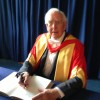
The 1970s and 1980s saw palliative care services starting all over Britain – hospices and NHS ‘continuing care units’, day units, home care services, hospital consultation services, ‘hospice at home’. Those were undeniably exciting times but they brought many problems and challenges.
Where were the trained staff?
There were no plans or policies in place to ensure that sufficient (neither too many nor too few) services were established to meet the needs that had been identified by Cicely Saunders and other pioneers with their missionary-like zeal, but sometimes an absence of measurement. Millions of pounds needed to be raised by the voluntary sector (something that proved much easier than anyone could have predicted) but where were the experts who knew what type of service was needed in this university city or in that small market town?
Where were the doctors, nurses, social workers, professionals allied to medicine, not only interested in palliative care but trained to deliver it?
What did other clinicians, medical and nursing academics, Health Authorities and Health Boards think of this new-comer in their hospital or catchment area? In particular, how would it be viewed by GPs? Would medical and nursing schools review their teaching of what was still known as Terminal Care or Care of the Dying? Would they make it examinable?
This led to questions about curricula, teaching aids, and who should do the teaching and at what stage in training.
Within a short time of starting each service, debate started on teaching material. Were booklets needed detailing the salient features of this care? Needless to say managers wanted statistics about admissions, deaths and discharges. This led to discussion about computerisation, analysis of data, data storage and collaboration with other data banks.
An invitation
Almost imperceptibly professional groups were formed, one of the first being Hospice Nurses, followed by Nurse Managers – neither seeing themselves as uniquely important but increasingly aware of issues related to their day-to-day work. At about the same time three physicians [1] working full-time in palliative care units (two in NHS units, one in a voluntary sector hospice), met informally – each feeling that a body representing doctors engaged in palliative medicine was needed.
Out of their deliberations came an invitation to all such doctors working in this emerging field, to met in Birmingham a few weeks later.A motion to found the Association for Palliative Medicine of Great Britain and Ireland was carried unanimously by 92 votes (and most of those unable to attend – about 40 – signified they were in favour a representative body). The year was 1986.
It will be noticed that Ireland (ie Eire) was included and the name of the work being done was Palliative Medicine (as in the specialty still to be created) and not ‘Hospice’ or ‘Terminal Care’ as many may have expected.
Hurt feelings
What perhaps should not have come as a surprise at the meeting and subsequently were the feelings of many GPs. They were hurt that some people did not appreciate that care of the dying was a long-recognised component of general practice – its provision a responsibility always taken very seriously. In the ensuing months considerable resentment was voiced when the first steps were taken towards Palliative Medicine gaining specialty status, requiring candidates to be Members of one of the Physicians’ Colleges. Even before then, however, some MRCPs and FRCPs resented GPs with ‘only’ MRCGP being appointed as consultants in new units.
Slowly but surely the Association gained a good reputation, curriculi were created and tested, excellent young doctors were attracted to this most rewarding part of medicine; research was warmly encouraged, soon increased and published. The question began to be asked if a journal devoted to palliative care was needed.
Those early days
From the outset the Association was served by excellent office staff and administrators – no easy task when the body’s committee members were scattered around the country. Two national organisations also took a deep interest in the Association and helped it in a great many ways – the Marie Curie Foundation (MCF) and Cancer Relief Macmillan Fund (CRMF). Finally the Association was much indebted to NAPP Laboratories for financial support.
Looking back to those early days the writer has no regrets whatsoever, but a lasting pride that something so necessary, so exciting and so challenging was created so amicably. Friendships were forged, skills shared, a new specialty conceived and, hopefully, many thousands of patients and families helped.
Derek Doyle
[1 ] Editor’s note: These were Derek Doyle, Richard Hillier, Robert Twycross. See Wellcome Witness Seminar on the history of palliative care, c1970-2010
To find out more about Dr Doyle, read A Salute to Derek Doyle, a blog post on his receiving the award of Honorary Doctor of Science from the University of Glasgow in July 2014.


I have forgotten the surname of Robert ?? who was one of the instigators of the APM at its first meeting in Birmingham in the ’80’s. I think that he was a professor of \medicine at Oxford.